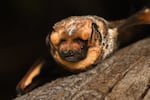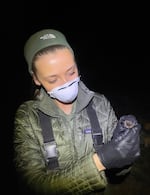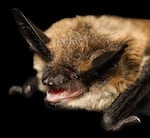
A hoary bat was photographed at the Oregon Caves National Monument during a survey conducted Sep. 26, 2024 by biologists from the Medford district of the Bureau of Land Management. The bat shown in this photo was named "Hoary Potter and the Guano of Fire" and won the Bureau of Land Management's annual Bat Beauty Contest, which was held from Oct. 24-31, 2024.
Emma Busk / Bureau of Land Management
A bat from Southern Oregon has been crowned the winner of the Bureau of Land Management’s annual Bat Beauty Contest. It’s the third consecutive year that a bat from Oregon has taken top honors.
The week-long competition ended this year, appropriately enough, on Halloween. It featured photos of bats taken primarily by government biologists who work with the winged mammals on public lands in 12 Western states, including Oregon.
Members of the public voted on the entries via the BLM’s Facebook and Instagram accounts, where the agency posted photos each days of bats given names bound to evoke chuckles or groans, depending on a visitor’s penchant for puns: Sir-Flaps-A-Lot, Robert Battinson, Batlor Swift, Honey Bunches of Myotis.
This year’s winner, a male hoary bat, was named Hoary Potter and the Guano of Fire. It triumphed in the final round over Lestat, a Western small-footed bat from Idaho.
Hoary Potter was photographed by Emma Busk, a wildlife technician in the Ashland field office of the Medford District of the BLM. She caught and photographed the bat in a mist net during a survey conducted at the Oregon Caves National Monument in Josephine County in September.

Emma Busk, a wildlife technician in the Ashland field office of the Medford District of the Bureau of Land Management, is shown holding a California myotis during a survey conducted July 25, 2024 in Butte Falls, OR. Busk won the annual BLM Bat Beauty Contest for a second year in a row on Oct. 31, 2024 for her photograph of a hoary bat.
Emily Ellison / Bureau of Land Management
But capturing and photographing a member of her favorite bat species proved to be a far bigger prize than winning.
“I was just like so, so excited,” Busk said.
“Their fur just makes my brain so happy. They’re so vibrant and they have this great, like dense, grizzled, frosted fur. And they are the largest species here in Oregon. Their wingspan extends up to 16 inches.”
Busk is also now a two-time winner of the Bat Beauty Contest. Last year, she won for a photograph of a Townsend’s Big-eared bat, one of the 15 species of bats native to Oregon. Eight of those are facing or at-risk of population decline and are targeted for additional conservation efforts by the state’s wildlife agency. A photo of a canyon bat native to Eastern Oregon that weighs less than a quarter of an ounce won the competition in 2022.
And while describing bats as “beautiful” might be a stretch for some, showcasing their diversity provides a valuable opportunity to change the image they may conjure as blood-sucking creatures of the night.

A long-eared myotis was photographed on Sep. 12, 2024 in Ashland, OR during a bat survey conducted by the biologists from the Medford district of the Bureau of Land Management. The bat shown in this photo was named "Honey Bunches of Myotis" and selected as a semifinalist in the Bureau of Land Management's annual Bat Beauty Contest which was held from Oct. 24-31, 2024.
Emma Busk / Bureau of Land Management
“I remember reading a study where participants who indicated they had a better knowledge about bats had a more positive attitude towards bats,” Busk said. “So one of the biggest challenges of bat conservation is trying to shift that public perception of them.”
It also helps to remind people about the vital role bats play in our ecosystems and the benefits they provide to farmers in Oregon and beyond.
“We have a little brown bat here in Oregon that can consume hundreds of mosquitoes in a night,” she said.
“Bats play a huge role in agricultural pest control and they save farmers billions of dollars a year, every year, in that pest control and also by reducing pesticide usage. … Being able to emphasize these ecological benefits that bats provide can help reshape their reputation.”
Emma Busk spoke to “Think Out Loud” host Dave Miller. Click play to listen to the full conversation.



